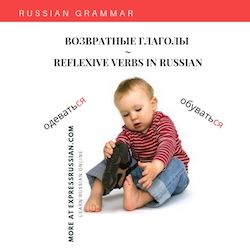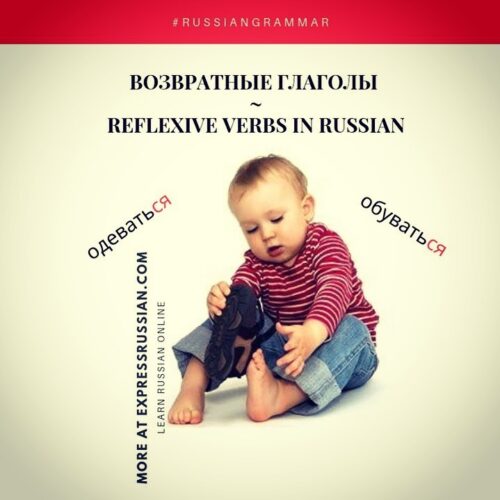In this article:
What are reflexive verbs?
Reflexive verbs in Russian (Возвратные глаголы в русском языке)
are verbs that end in postfix –ся / –сь. This postfix is an archaic form of the reflexive pronoun себя / self in the accusative case. This prefix merged with the initial verb in the old Russian language, creating new meanings of the corresponding verbs.
You could think of it as a shortened version of (verb + self) construction, for example одеваться – to dress yourself, умываться – to wash your face.
Postfix –ся is used after consonants: окружаются, признаются
Postfix –сь is used after vowels: опушилась, поднялось
How reflexive verbs are used in the Russian language
It is worth paying attention that many reflexive verbs derive from non-reflexive (for example, брать – to take vs браться – to start off, готовить – to prepare vs готовиться to prepare yourself)
There are also non-derivative verbs that can never be used without postfixes –ся / -сь (for example, нравиться – to like, смеяться – to laugh, бороться – to fight, etc.).
Postfix –ся / –сь, except for its main function (to change the state of the verb, in particular, excluding the possibility of transitivity), sometimes modifies the lexical meaning of the verb:
раздаться – to grow strong, to grow stout) vs раздать (отдать всё без остатка) – to give everything away.
In combination with prefixes рас-/раз-, из-, на-, до-, вы–, reflexive verbs express completeness and intensity of the action or state (разговориться – to talk with ease, наговориться – to talk a lot, договориться – to agree with somebody, выговориться – to say everything on one’s mind vs говорить to speak).
More on Russian prefixes
Types and meaning of reflexive verbs in Russian
- personally-directed (лично–возвратное): одеваться – to dress oneself, умываться – to wash oneself
- reciprocal (взаимно–возвратное): обниматься – to hug, встречаться – to meet, целоваться – to kiss
- general reflexion (общевозвратное): выбираться – to get out, склоняться – to incline, разбираться – to understand
- description of objectless activity (активно–безобъектное): собака кусается – dog bites
- description of passive qualitative action (пассивно–качественное): проволока гнётся – wire bends, огонёк светится – light glows, смеркается – it’s getting darker

Conjugation of reflexive verbs in Russian
Reflexive verbs in Russian are conjugated in the same way as other verbs. They take the ending according to tense, gender, and number, plus they keep their reflexive endings –ся / –сь.
Related: Reflexive Verbs in Past Tense
Related: Russian Verbs in Future Tense
Reflexive verbs in other languages
Reflexive verbs exist in many European languages. However, in other languages the reflexivity is mostly lost, in verbs where it’s not lost – the connection to oneself or others is reflected by separate words, like “self” placed before the verb.
French: Je me lave. English: I wash myself.
In Russian, reflexivity is mostly expressed via adding postfix –ся / -сь.
Together with or instead of reflexive verbs, one can reinforce the reflexivity by additional reflexive pronouns, such as: сам, сам себя, самому себе – itself, с самим собой – with itself, друг друга – each other.
And lastly, we do not use other (additional) nouns and pronouns in accusative case after reflexive verbs in Russian, in other words, all these verbs are intransitive.
See explanations and examples of French and English verbs here.
We hope you liked our article about reflexive verbs in Russian.
Did you know such words exist in other languages?
Learn Russian online:
Find us on YouTube, browse our playlists created for various levels of Russian language skills or create your own
Learn Russian at your own pace
BASIC RUSSIAN VOCABULARY – FREE EBOOK
ONLINE SELF-PACED COURSE ON RUSSIAN CASES
ONLINE SELF-PACED COURSE “RUSSIAN GRAMMAR FOR BEGINNERS”

Above all, we encourage you to follow ExpressRussian on




for your daily dose of Russian!
Learn Russian online with our blog – you will love it!

